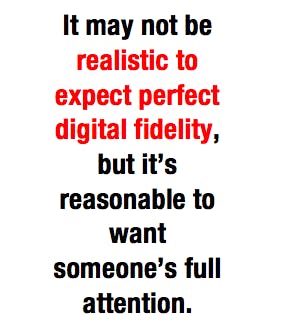Thanks to the Internet, we now have a host of new ways to offend, enrage, misinterpret, creep out, or alienate people. In the Tangled Web, we field your questions about how to be a decent human online. Have a question? Ask jess@dailydot.com.
Yesterday I was having an intense gchat conversation with my friend, and afterwards noticed that she had posted a lengthy Facebook update that she was clearly composing while we were talking. I admit I was a little taken aback. Is this cheating, or is this simply multi-tasking? Is it crazy to expect that we would all be digitally monogamous, doing one thing at a time?
Realistically, yeah, it’s probably a little crazy to expect total monogamy. No doubt we’ve gotten more distractible as a culture, but we’ve never truly been unitaskers anyway—even back when we had our intense conversations over the phone, we were probably also folding laundry or whatever. OK, letter-writers in Jane Austen days may have sat down to communicate and done nothing else until they were finished, but I wrote tons of letters when I was a teen and I usually had the TV on (or, even more likely, I was in class). Running a background process while you’re talking to your friends is probably not ideal, but it’s a time-honored foible.
 It’s true, though, that this feels like much more of a violation when both the conversation and the distraction involve the written word. Maybe it’s because the two activities are so similar, and take up the same kind of mental resources—suddenly it’s less like making out while half-watching a movie, and more like making out while diddling someone else. If the conversation is deep and engaging, it feels like a betrayal to realize “hey, you were using those exact same brainmeats for something else at the same time? You were giving me only half your brainergies?”
It’s true, though, that this feels like much more of a violation when both the conversation and the distraction involve the written word. Maybe it’s because the two activities are so similar, and take up the same kind of mental resources—suddenly it’s less like making out while half-watching a movie, and more like making out while diddling someone else. If the conversation is deep and engaging, it feels like a betrayal to realize “hey, you were using those exact same brainmeats for something else at the same time? You were giving me only half your brainergies?”
Maybe it’s crazy to expect that when we talk to our friends, they’ll give us their full attention. On the whole, we probably don’t really expect it—we chat people knowing they’re at work, or reply to them even though they’re tweeting from the grocery store, or text them not knowing where they are. We are aware that the Twitter client or chat box lives on a busy, multi-tabbed web browser, floating in an incalculably vast Internet. But it’s OK to expect it, or at least desire it, during deep discussions—or at least desire not having it rubbed in your face that you’re getting only part of your friend’s brain. It may not be realistic to expect perfect digital fidelity, but it’s reasonable to want someone’s full attention for an intense conversation. It’s very reasonable to want to at least pretend.
Accordingly, I think you can say something to your friend. I don’t think it’s a good idea to have A Big Talk—this isn’t real cheating, after all, not even real friend-cheating, which what would that constitute anyway. But next time this happens, a half-joking “hey, were you writing that big Facebook post while I was pouring my heart out?? Jeez!” is not overstepping your bounds. Don’t make it seem like you’re demanding an apology, but do let her know that you noticed and found it mildly though not catastrophically dismaying. It may make her think about whether she’s shortchanging you on attention.
But it may not. Note that you only realized she was half-absent when you saw the Facebook post. If she’s present and active in the conversation with you, should it really concern you that she’s not giving you her full attention? Or should it just make you proud that you have a friend with such communication superpowers that she can apparently give you full conversational support AND write a giant Facebook update at the same time?
Signed, a person who wrote this entire answer while chatting with a friend about his relationship.
Jess Zimmerman has been making social blunders on the Internet since 1994. Most of her current interpersonal drama takes place on Twitter (@j_zimms).
Illustration by Jason Reed


